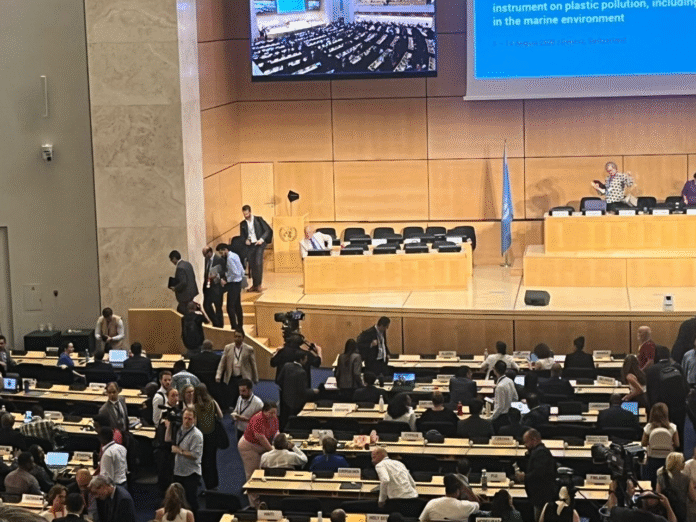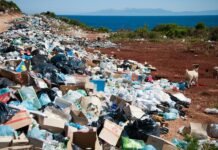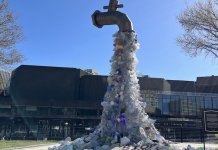After three years of negotiations across continents, the final round of talks in Geneva (INC 5.2) to arrive at a legally binding global treaty to combat plastic pollution ended without any outcome on Friday, 15 August, hours after the deadline was extended to enable all stakeholders from 185 countries to reach a consensus. It was not clear as to when, where and how the talks would resume.
The talks collapsed after ‘weak draft’ released by the Chair of the Intergovernmental Negotiating Committee on Plastic Pollution triggered sharp reactions, as high-ambition countries and civil-society battling for polymer and plastic production cuts locked horns with a few oil-producing nations – such as Saudi Arabia, Kuwait, Russia, Iran, and Malaysia — and the petrochemicals lobby trying to dumb down the problem as a waste management issue. A revised version released after Thursday midnight failed to pacify both sides. Joining the petro states, the US, reports said, refused to agree to anything beyond voluntary measures.
The High Ambition Coalition led by Norway, which includes the European Union, Britain and Canada, and many African and Latin American countries, supported a reduction in plastic production and the phasing out of toxic chemicals used in plastics –key factors diluted in the first draft released by chair Luis Vayas Valdivieso.
“As Co-Chairs of the High Ambition Coalition, we are truly sad to see that we will not have a treaty to end plastic pollution here in Geneva,” Andreas Bjelland Eriksen, minister of Climate and Environment, Norway, said in a statement delivered in the final plenary session of INC 5.2 in Geneva.
Bjelland Eriksen said the coalition had pitched for a treaty that addressed the full life cycle of plastics as well as unsustainable consumption and production of plastics. It had to include global measures and criteria on plastic products, and chemicals in products; ensure that the treaty can evolve over time, including the possibility of voting; and be supported by financing and means of implementation that mirror the level of ambition in the treaty.
“We thank the INC Chair for his efforts and commitment to bringing this INC to a successful close, through revising the text in a second iteration providing us with a more balanced text reflecting the progress made in this meeting. We are sorry to see that we, despite all efforts to bring us closer together, we will not be able to finalize negotiations on an acceptable outcome,” Bjelland Eriksen said.
Just to give a quick recap, in March 2022, the United Nations Environment Assembly (UNEP) agreed to create a legally binding international law to reduce plastic pollution worldwide, covering the full lifecycle of plastic. This followed a series of consultations – INC-1 in Punta del Este in November 2022, INC-2 in Paris in June 2023, INC-3 in Nairobi in November 2023, and INC-4 in Ottawa in April 2024. What was supposed to be the fifth and final round in Busan, South Korea, (INC 5.1) in November 2024, ended in a stalemate, forcing the negotiators to meet against in Geneva for INC 5.2.
As we have written earlier, the following ambitious measures with strong international support were cut from the Chair’s text, among others – Over 100 countries support plastic production cuts; Over 100 countries support a binding product and harmful chemicals phaseouts; almost 130 countries support a dedicated article on health; over 150 countries support a strong financial mechanism.
Campaigners upset
Civil society and campaigners were quite forthcoming in their criticism of the way the talks were hijacked by a few countries. They urged world leaders to persevere towards a strong, legally binding treaty that cuts plastic production and protects human health, human rights, and the environment.
“There is no denying that these entire negotiations have been captured by the petrochemical industry,” the Manila-headquartered Break Free From Plastic said. It quoted an investigation by the Center for International Environmental Law (CIEL) that tracked how an increasing number of fossil fuel and chemical industry lobbyists registered to participate in each round of Plastics Treaty negotiations, culminating in 234 lobbyists at INC-5.2. These estimates are likely conservative as only those lobbyists who openly disclose their connections were counted.
Ana Rocha, Global Plastics Policy director at the Global Alliance for Incinerator Alternatives (GAIA) states, “No treaty is better than a bad treaty. We stand with the ambitious majority who refused to back down and accept a treaty that disrespects the countries that are truly committed to this process and betrays our communities and our planet. Once again, negotiations collapsed, derailed by a chaotic and biased process that left even the most engaged countries struggling to be heard. A broken, non-transparent process will never deliver a just outcome. It’s time to fix it—so people and the planet can finally have a fighting chance.”
Despite the fact that the vast majority of countries agreed on the need to cut plastic production, phase out harmful chemicals, ensure a Just Transition, especially for waste pickers, establish a new dedicated fund, and make decisions through a 2/3 majority voting when consensus cannot be reached, among other ambitious measures, a small group of petro-states calling themselves the “like-minded countries” sabotaged each round of talks by insisting on consensus to block ambition, and threatening to trap negotiations in procedural debate if Member States ever called for a vote, GAIA said.
Around 460 million metric tons of plastic are produced every year, of which 20 million end up polluting our environment. Only 10% of it is recycled. The rest goes to landfills, is incinerated or ends up as litter – in land or water. According to estimates, global plastic waste is expected to reach 1.7 billion metric tons by 2060.
Joan Marc Simon, founder at Zero Waste Europe, said the world has wasted three years of negotiations in which petrostates haven’t moved an inch to compromise. Expressing the brighter side, he said, “It’s good we have avoided a bad treaty which would do nothing to address plastic pollution…The negotiations have not provided a treaty but have been extremely helpful to build knowledge, alignment and discuss what a good treaty would look like for those interested… Time to rest, digest all of this and organize the way forward.”
According to Graham Forbes, Global Plastics Campaign Lead at Greenpeace USA, the inability to reach an agreement in Geneva must be a wakeup call for the world: ending plastic pollution means confronting fossil fuel interests head on. “The vast majority of governments want a strong agreement, yet a handful of bad actors were allowed to use process to drive such ambition into the ground. We cannot continue to do the same thing and expect a different result. The time for hesitation is over.”
Plastic lobby reacts
The plastics and petro-chemicals industries in a statement, however, said INC 5.2 underscores the need for compromise to finalize the global plastic pollution agreement. Marco Mensink, council secretary of the International Council of Chemical Associations (ICCA) and director general of Cefic, speaking on behalf of the Global Partners for Plastics Circularity (GPPC), said, “While not concluding a global agreement to end plastic pollution is a missed opportunity, we will continue to support efforts to reach an agreement that works for all nations and can be implemented effectively.”
The global coalition of plastics and chemical manufacturers, Mensink said, remains committed to supporting a treaty that keeps plastics in the economy and out of the environment by advancing a circular economy—designing products for reuse and recycling, collecting them at end of life, and remaking them into new products. “Across every region, our members are investing in the infrastructure, technologies, and design changes needed to make plastics more reusable, recyclable, and less likely to become pollution.”












